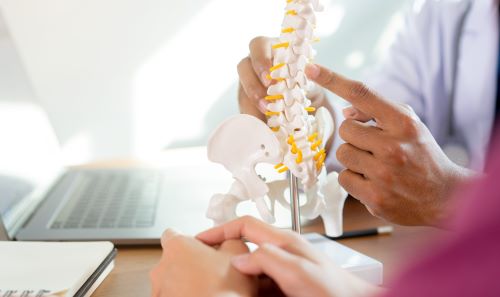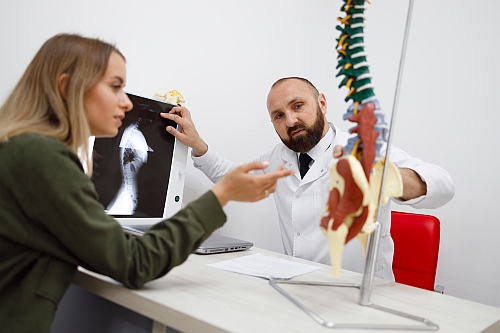Finding the right medical professional is crucial to effective treatment and relief when dealing with persistent back pain or spinal issues. But with so many terms and specialists in the field, you might wonder: What is a back specialist called? From orthopedic surgeons and physical therapists to pain management specialists and chiropractors, various experts are dedicated to diagnosing and treating back pain and spinal conditions. Each professional offers unique expertise, depending on the severity and nature of the issue.
In this blog, we’ll discuss the types of back specialists, the conditions they treat, and the care they provide, while highlighting the expert services available at our Atlanta medical clinic to help you find relief and restore your quality of life.
Types of Back Specialists
When it comes to addressing back pain, several specialists can assist in diagnosis and treatment. Each type of back specialist focuses on different aspects of spinal health and offers various treatment options. Understanding these roles can help you find the right professional for your condition.
General Practitioners and Primary Care Doctors
General practitioners often serve as the initial point of contact for individuals experiencing back or neck pain. They conduct basic evaluations and can perform initial diagnostic tests. If necessary, they will refer patients to specialized doctors who have more expertise in treating specific spinal issues.
Orthopedic Surgeons and Orthopedists
Orthopedic surgeons are experts in the musculoskeletal system. They diagnose and treat a wide range of conditions, including herniated discs and spinal fractures. These specialists can perform both surgical and non-surgical treatments, making them a crucial resource for patients in need of spine surgery or other interventions.
Neurologists and Neurosurgeons
Neurologists focus on the nervous system, including the spinal cord. They are skilled in diagnosing and treating spinal disorders that affect nerve function. Neurosurgeons, a subset of neurologists, perform surgeries to relieve pressure on nerves and treat conditions like spinal tumors or traumatic injuries.
Physiatrists (Physical Medicine and Rehabilitation Physicians)
Physiatrists specialize in rehabilitation and pain management. They create personalized treatment plans that may include physical therapy, medication, and lifestyle modifications. Their goal is to restore function and improve quality of life for patients suffering from back pain and related conditions.
Chiropractors
Chiropractors focus on manual manipulation of the spine and surrounding tissues. They aim to alleviate pain and enhance mobility through hands-on techniques. Commonly treated conditions include facet joint dysfunction and slipped discs.
Physical Therapists
Physical therapists develop treatment plans that emphasize movement and exercise. They work with patients to improve range of motion, strengthen muscles, and reduce pain. Their approach often includes tailored exercises and rehabilitation strategies designed to enhance overall spinal health.
Pain Management Specialists
Pain management specialists concentrate on reducing pain through various non-surgical methods. They utilize interventional techniques such as injections, nerve blocks, and medication management. Their expertise is vital for patients whose pain persists despite other treatments.
Rheumatologists
Rheumatologists address autoimmune and musculoskeletal disorders that can affect the spine. They specialize in treating inflammatory conditions, providing care for patients with complex spinal issues that may require a multidisciplinary approach.
Conditions Treated by Back Specialists
Back specialists are trained to address a variety of spinal conditions that can cause discomfort and limit mobility. Understanding these conditions can help patients seek the appropriate care.
Spinal Stenosis
Spinal stenosis occurs when the spinal canal narrows, putting pressure on the spinal cord and nerves. This can lead to pain, numbness, or weakness in the legs. Treatment may include physical therapy or, in severe cases, surgery to relieve pressure.
Cervical Radiculopathy
Cervical radiculopathy is caused by a pinched nerve in the neck, often due to herniated discs or bone spurs. Symptoms can include pain that radiates down the arm, tingling, or muscle weakness. Pain management specialists may recommend physical therapy or injections to alleviate symptoms.
Sciatica
Sciatica is characterized by pain that travels along the sciatic nerve, which runs from the lower back down to the legs. Often caused by a herniated disc or spinal stenosis, treatment may involve physical therapy, medications, or even surgery if conservative methods fail.
Spondylolisthesis
Spondylolisthesis occurs when one vertebra slips over another, potentially causing back pain and nerve compression. Treatment options typically include physical therapy, medications, and, in some cases, surgical intervention to stabilize the spine.
Herniated Discs
A herniated disc happens when the soft material inside a disc pushes out through a tear in the tougher exterior. This can lead to significant pain and nerve issues. Treatment often involves non-surgical methods like physical therapy or pain management techniques, but surgery may be necessary for severe cases.
Degenerative Disk Disease
As people age, the discs in the spine can degenerate, leading to pain and reduced mobility. This condition is common and can be managed with physical therapy, pain relief medications, and lifestyle changes to maintain spinal health.
Spinal Cord Injuries
Spinal cord injuries can result from trauma and may lead to permanent changes in strength, sensation, and other bodily functions. Treatment focuses on rehabilitation and pain management to improve the patient’s quality of life.
Myelopathy
Myelopathy refers to spinal cord dysfunction caused by compression. Symptoms can include weakness, numbness, and coordination issues. Treatment usually involves addressing the underlying cause, which may include surgery or physical therapy to enhance mobility and function.
Diagnostic and Treatment Approaches
When dealing with back pain, accurate diagnosis is crucial. Back specialists use various diagnostic tests to identify the root cause of pain. This often begins with a thorough medical history and physical examination. Following this, imaging techniques such as X-rays, MRIs, or CT scans may be employed. These tests allow specialists to visualize the spine, identify abnormalities, and assess the condition of the surrounding tissues.
Diagnostic Tests
- X-rays: Useful for detecting fractures, misalignments, and degenerative changes in the spine.
- MRI (Magnetic Resonance Imaging): Provides detailed images of soft tissues, including discs and nerves, helping to identify issues like herniated discs or spinal stenosis.
- CT Scans (Computed Tomography): Combines X-ray images to create cross-sectional views of the spine, useful in complex cases.
Treatment Options
Once a diagnosis is made, back specialists develop a treatment plan tailored to the individual’s needs. Options may include:
- Physical Therapy: Aimed at improving strength, flexibility, and mobility. Physical therapists design specific exercise programs to alleviate pain and enhance function.
- Medications: Nonsteroidal anti-inflammatory drugs (NSAIDs) and muscle relaxants are commonly prescribed to manage pain and inflammation.
- Injections: Interventional pain management techniques, such as epidural steroid injections, can provide temporary relief by reducing inflammation around the nerves.
- Surgery: In cases where conservative treatments fail, spine surgery may be necessary. Procedures can range from minimally invasive techniques to more extensive surgeries, depending on the condition.
Importance of Specialized Care
When dealing with severe back pain, consulting a back specialist is crucial. General practitioners may provide initial assessments, but they often lack the specialized training needed to address complex spinal conditions. Back specialists, including orthopedic surgeons and pain management experts, have the knowledge and skills to diagnose and treat specific issues effectively.
Targeted Treatment Plans
Specialized care offers targeted treatment plans tailored to individual needs. These plans may include advanced diagnostic tests, such as MRIs or CT scans, to pinpoint the exact source of pain. Once the cause is identified, back specialists can recommend appropriate treatments, which may include physical therapy, medication, or, in some cases, surgery. This focused approach helps patients achieve better outcomes and faster recovery.
Expertise in Spinal Disorders
Back specialists are well-versed in various spinal disorders. They understand the nuances of conditions like herniated discs, spinal stenosis, and sciatica. Their expertise allows them to provide not just immediate pain relief but also long-term solutions. This is especially important for patients who have experienced chronic pain or have not found relief through general medical care.
Enhanced Quality of Life
Seeking care from a back specialist can significantly enhance a patient’s quality of life. With the right treatment plan, many individuals experience reduced pain and improved mobility. This can lead to a more active lifestyle, better mental health, and overall well-being. Specialized care is not just about treating symptoms; it’s about helping patients regain control over their lives.
Seek Care at Our Atlanta Medical Clinic ASAP!
If you’re struggling with spinal pain and want to see a back specialist, don’t wait to seek the care you deserve. Our team at Georgia Spine & Orthopaedics is here to help!
Contact us at 678-929-4494 to schedule an appointment today!






